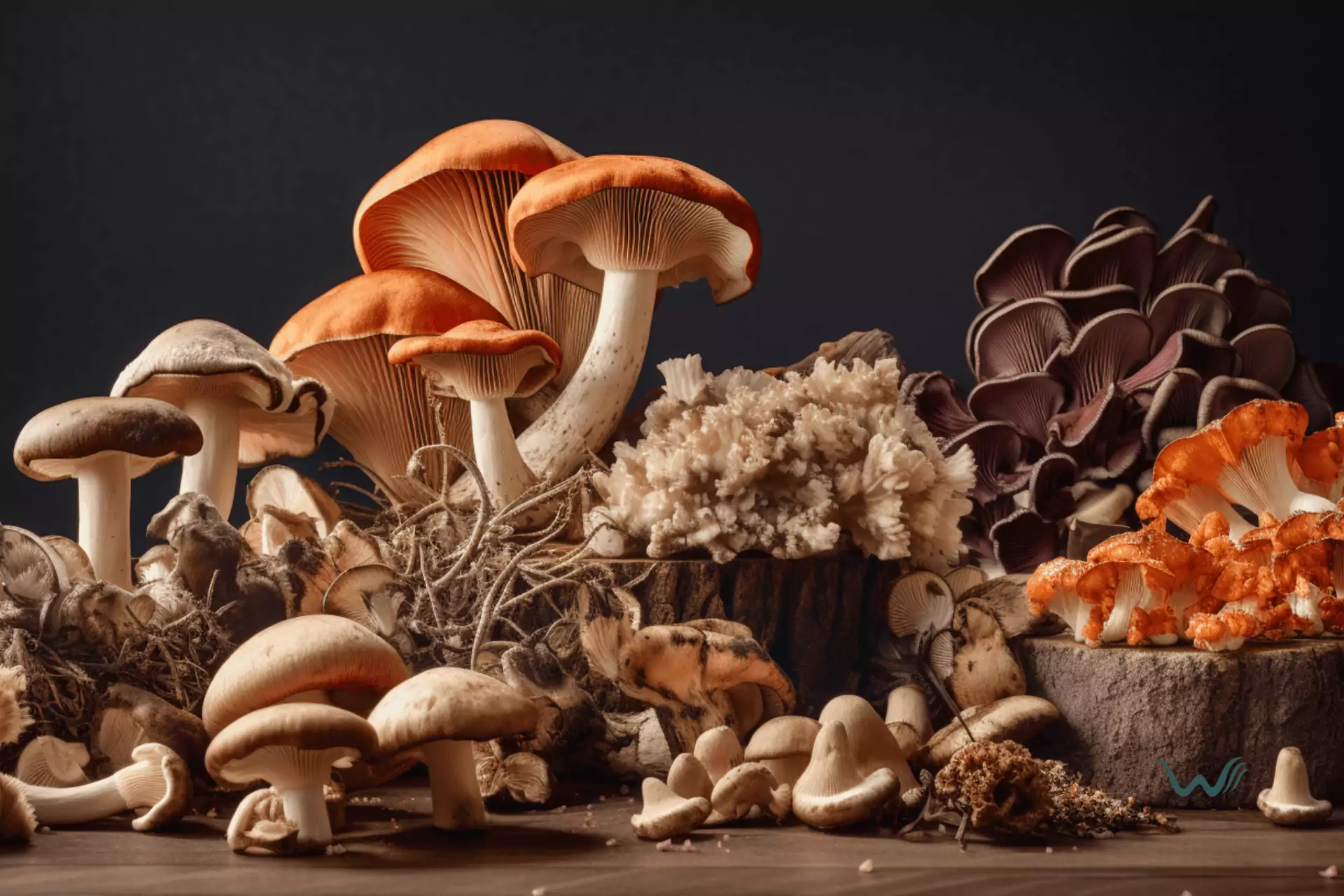

Top 5 Mushrooms To Safely Feed Your Dog
by Haley Mills
Last updated: January 30, 2024
Verified and Approved by:
Angela Morris,
MSW, LCSW
Fact Checked

Are you seeking a healthy and nutritious treat to add to your dog’s diet? Look no further than mushrooms! Not only are mushrooms a delicious addition to your own meals, but they can also provide numerous benefits for your furry friend. However, it’s important to note that not all mushrooms are safe for dogs to consume. This article will explore the top 5 safe and beneficial mushrooms for your dog’s health.
Mushrooms are not only a tasty addition to meals, but they also offer a variety of nutritional benefits for your dog. They are a great source of vitamins, minerals, and antioxidants, which can support your dog’s overall health and well-being. Additionally, mushrooms are low in calories and fat, making them an excellent choice for dogs that need to maintain a healthy weight. However, ensuring that you are feeding your dog the right mushrooms is crucial, as some varieties can be toxic. Following our guide, you can safely incorporate mushrooms into your dog’s diet and provide them with a delicious and nutritious treat.
Identifying Safe Mushrooms for Dogs
Now that you know the importance of identifying safe mushrooms for your furry friend, let’s dive into the top 5 mushrooms you can confidently feed your dog. It’s crucial to ensure that the mushrooms you choose are safe and provide nutritional benefits for your dog’s health. The first mushroom on our list is the white button mushroom. This common mushroom is safe for dogs and can be easily found in grocery stores. It is low in calories and fat, making it a healthy choice for your pup. Additionally, white button mushrooms contain vitamins B and D, as well as minerals like potassium and selenium, which can support your dog’s immune system and promote overall well-being.
The second mushroom on our list is the shiitake mushroom. This mushroom is not only safe but also offers numerous health benefits. Shiitake mushrooms are packed with vitamins and minerals, including B vitamins, vitamin D, iron, and zinc. These nutrients can help boost your dog’s immune system and improve their overall health. Shiitake mushrooms also contain a compound called lentinan, which has been found to have anti-cancer properties. However, it’s important to note that while shiitake mushrooms are safe for dogs, they should be cooked before being served to your furry friend. Raw mushrooms can be difficult for dogs to digest and may cause gastrointestinal upset.
Nutritional Benefits of Mushrooms for Dogs
Feeding your furry companion mushrooms can provide them with various nutritional benefits that will help support their overall health and well-being. Mushrooms are a great source of vitamins, minerals, and antioxidants. They are low in calories and fat, making them a healthy addition to your dog’s diet. Mushrooms are also a good source of fiber, which can aid in digestion and promote a healthy gut. Additionally, mushrooms contain compounds that have been shown to have anti-inflammatory and immune-boosting properties, which can help keep your dog’s immune system strong and protect against diseases.
One of the key nutrients found in mushrooms is vitamin D. This vitamin plays a crucial role in bone health and can help prevent conditions like osteoporosis. Mushrooms are one of the few natural sources of vitamin D, making them an excellent choice for dogs who may not be getting enough of this important nutrient. Mushrooms also contain B vitamins, such as riboflavin and niacin, which are essential for healthy skin and coat. These vitamins can help keep your dog’s fur shiny and prevent dryness and flakiness.
In conclusion, adding mushrooms to your dog’s diet can give them a range of nutritional benefits. From vitamins and minerals to antioxidants and immune-boosting compounds, mushrooms are a healthy and delicious addition to your furry friend’s meals. Just be sure to choose safe mushrooms and introduce them gradually to your dog’s diet to avoid any potential digestive upset.
Preparing Mushrooms for Your Dog’s Consumption
When preparing mushrooms for your furry friend, it’s important to ensure they are safe for consumption. Not all mushrooms are safe for dogs to eat, as some can be toxic and cause serious health issues. Knowing which mushrooms are safe and how to prepare them for your dog’s consumption properly is crucial.
First, it’s essential only to feed your dog mushrooms that are safe for them to eat. Some safe options include white button mushrooms, shiitake, oyster, portobello, and porcini mushrooms. These mushrooms are generally safe for dogs and can provide them with various nutritional benefits. However, it’s always a good idea to introduce new foods gradually and in small quantities to ensure that your dog doesn’t have any adverse reactions.
When preparing mushrooms for your dog, it’s important to cook them thoroughly. Raw mushrooms can be difficult for dogs to digest and may cause digestive upset. Cooking the mushrooms not only makes them easier for your dog to digest but also helps to break down any potentially harmful compounds. You can cook the mushrooms by sautéing them in a small amount of dog-safe oil or boiling them until they are soft. Avoid using any seasonings or additives that could harm your dog, such as garlic or onions. Once the mushrooms are cooked, let them cool down completely before serving them to your furry friend. By following these guidelines, you can ensure that the mushrooms you prepare for your dog are safe and enjoyable for them to eat.
Potential Risks and Toxic Mushrooms to Avoid
Beware of the potential risks and toxic mushrooms you should avoid giving to your furry friend. While there are many mushrooms that are safe for dogs to consume, there are also several that can be toxic and even fatal. It is important to be aware of these dangerous mushrooms and ensure that you do not feed them to your dog.
One of the most toxic mushrooms for dogs is the Amanita phalloides, also known as the Death Cap mushroom. This mushroom contains toxins that can cause severe liver damage and even death in dogs. Another toxic mushroom to avoid is the Amanita muscaria, also known as the Fly Agaric. Ingesting this mushroom can lead to symptoms such as vomiting, tremors, and in severe cases, seizures.
It is also important to be cautious of wild mushrooms in general, as many can be toxic to dogs. Some common toxic wild mushrooms include the Destroying Angel, the False Morel, and the Panther Cap. These mushrooms can cause a range of symptoms, including gastrointestinal upset, liver damage, and even organ failure.
To keep your dog safe, it is best to avoid feeding them any mushrooms that you are unsure of. If you suspect your dog has ingested a toxic mushroom, it is important to seek veterinary care immediately. Remember, it is always better to be safe than sorry about your furry friend’s health and well-being.
Can Mushrooms be Included in a Zero Waste Dog Food Diet?
Yes, mushrooms can be included in the ultimate zero waste dog food diet. Certain types like shiitake and maitake are safe and beneficial for dogs. They can provide a good source of protein, fiber, and antioxidants while minimizing food waste. Always consult with a vet before making any dietary changes.
Monitoring Your Dog’s Response to Mushroom Consumption
Keep an eye on how your pup reacts after eating different types of mushrooms. While some mushrooms are safe for dogs to consume, others can cause gastrointestinal upset, vomiting, diarrhea, or even more severe symptoms like liver or kidney damage. Be sure to monitor your dog closely for any adverse reactions and seek veterinary attention if necessary.
If you notice any unusual behavior or symptoms after your dog has eaten mushrooms, it’s important to act quickly. Contact your veterinarian and inform them about the type of mushroom your dog has consumed, as well as any observed symptoms. They will be able to provide guidance on whether further treatment is necessary and what steps to take to ensure your dog’s safety and well-being. Remember, prevention is always the best approach, so it’s important to keep your dog away from wild mushrooms and only feed them safe varieties that have been properly identified. By monitoring your dog’s response to mushroom consumption, you can help keep them healthy and safe.
Summary
Mushrooms can be a beneficial addition to your dog’s diet when chosen and prepared properly. You can provide your furry friend with a wholesome and tasty treat by identifying safe mushrooms for dogs and understanding their nutritional benefits. However, be aware of the potential risks and toxic mushrooms to avoid, as well as monitor your dog’s response to mushroom consumption.
Remember to always consult with your veterinarian before introducing any new foods into your dog’s diet, including mushrooms. They can provide guidance on which mushrooms are safe for your specific dog and help you determine the appropriate portion size. When preparing mushrooms for your dog, cook them thoroughly to enhance their digestibility and remove any potentially harmful bacteria or toxins. It is also essential to avoid seasoning the mushrooms with any ingredients that may be harmful to dogs, such as garlic or onions.
While mushrooms can provide various health benefits for dogs, it is crucial to exercise caution and be aware of any potential adverse reactions. Keep a close eye on your dog after they consume mushrooms and watch for any signs of digestive upset or allergic reactions. If you notice any concerning symptoms, contact your veterinarian immediately. Following these guidelines, you can safely incorporate mushrooms into your dog’s diet and provide them with a nutritious and delicious treat.
Certify Your Emotional Support Animal Today

Why You Can Rely on Us?
At Wellness Wag, we believe your pet deserves care rooted in both science and compassion. Each article is carefully researched, written in clear language for pet owners, and then reviewed by qualified professionals to ensure the information is evidence-based, current, and practical for real-life care. Our goal is to help you feel confident in making informed decisions about your pet’s health and well-being.
Reviewed by
Angela Morris, MSW, LCSW
Angela is a licensed clinical social worker with 20 years of experience in patient advocacy and community mental health. She has assisted numerous clients with ESA evaluations and brings a deep understanding of disability accommodations, ensuring that all information is accurate, supportive, and practical.

Written by :
Haley Mills
Last Updated :
January 30, 2024










